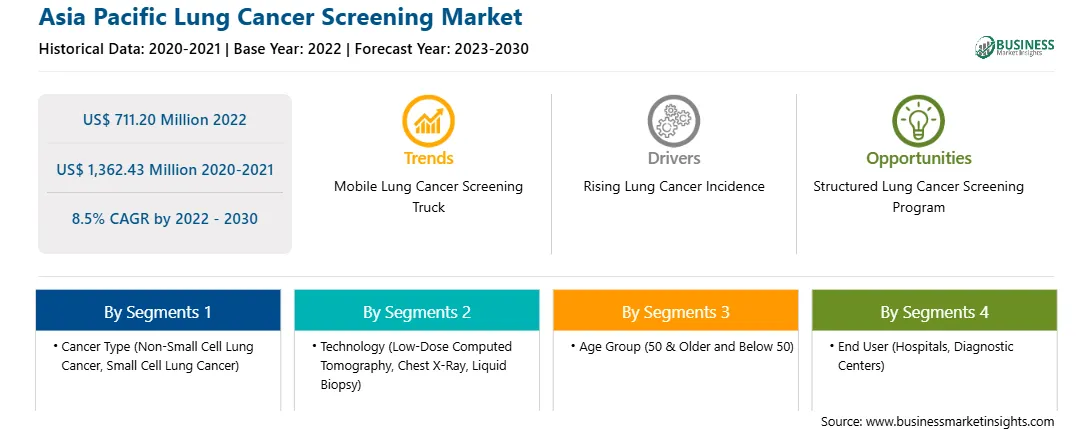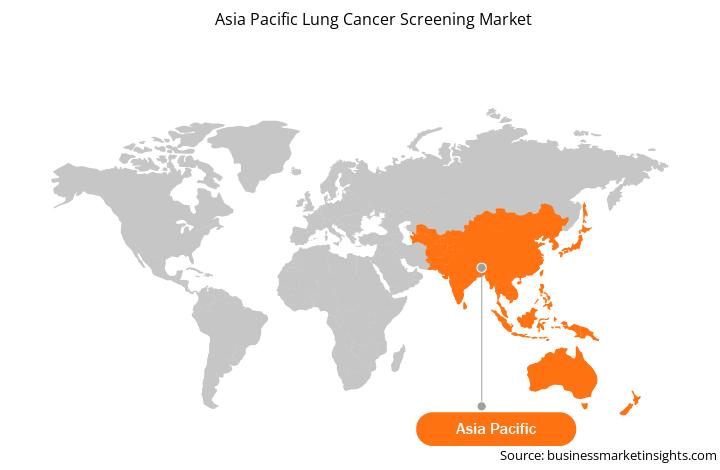亚太地区肺癌筛查市场预测至 2030 年 – 区域分析 – 按癌症类型 [非小细胞肺癌 (NSCLC) 和小细胞肺癌]、技术 [低剂量计算机断层扫描 (LDCT)、胸部 X 线-射线、液体活检等]、年龄组(50 岁及以上和 50 岁以下)和最终用户(医院、诊断中心等)
No. of Pages: 132 | Report Code: BMIRE00029045 | Category: Life Sciences
No. of Pages: 132 | Report Code: BMIRE00029045 | Category: Life Sciences
一些国家面临肺癌筛查计划的挑战。以人口为基础的澳大利亚筛查计划的一些例子包括“BreastScreen”、“国家肠癌筛查计划”和“国家宫颈癌筛查计划”。
代表卫生部、RIVM 人口筛查中心 (RIVM-CvB) 领导和管理国家人口筛查计划;根据该计划,所有荷兰公民都被邀请在其生命中的某个阶段参加一项国家筛查计划。纽约州启动、设立并资助三个癌症人群筛查计划。
因此,对结构良好的计划(例如基于社区的计划或临床医生和潜在参与者之间共享、知情的决策计划;经认可的报告中心;以及用于质量控制、监测和结果报告的中央数据登记处。此外,综合戒烟干预、支持成本效益的国际数据、额外的死亡率福利和高可持续性率是肺癌筛查必须研究的几个因素。此外,国际肺癌研究协会建议在不参与肺癌筛查研究的亚太国家实施可行性筛查计划。这些计划包括戒烟举措、用于选择和管理筛查参与者的标准化算法,以及管理具有积极筛查结果的参与者的专业多学科团队。因此,在预测期内,实施结构化肺癌筛查计划预计将成为肺癌筛查市场的一个利润丰厚的机会。
亚太地区肺癌筛查市场分为中国、日本、印度、韩国、澳大利亚和亚太其他地区。该地区的增长归因于多种因素,例如肺癌发病率的增加和人们吸烟率的增加。此外,政府对筛查的支持不断增加,导致市场进一步增长。
亚太地区肺癌筛查市场细分< /strong>
亚太地区肺癌筛查市场按癌症类型、技术、年龄组、最终用户和国家/地区进行细分。
根据癌症类型,亚太地区肺癌筛查市场分为非小细胞肺癌 (NSCLC) 和小细胞肺癌。 2022年,非小细胞肺癌(NSCLC)细分市场在亚太肺癌筛查市场中占据更大份额。
基于技术,亚太肺癌筛查市场将占据更大份额。筛查市场分为胸部 X 光检查、低剂量计算机断层扫描 (LDCT)、液体活检等。 2022年,胸部X光检查在亚太地区肺癌筛查市场中占据最大份额。
根据年龄组,亚太地区肺癌筛查市场分为以下几类: 50 岁及以上和 50 岁以下。2022 年,50 岁及以上人群在亚太地区肺癌筛查市场中占据较大份额。
根据最终用户,亚太地区肺癌筛查市场癌症筛查市场分为医院、诊断中心等。 2022年,医院细分市场在亚太地区肺癌筛查市场中占据最大份额。
按国家/地区划分,亚太地区肺癌筛查市场分为中国、日本、印度、澳大利亚、韩国和亚太其他地区。 2022 年,中国将主导亚太地区肺癌筛查市场。
Intelerad Medical Systems Incorporated、Nuance Communications Inc、GE HealthCare Technologies Inc、Medtronic Plc、Canon Medical Systems Corp、Koninklijke Philips NV 和Siemens AG 是亚太地区肺癌筛查市场上的一些领先公司。
Strategic insights for Asia Pacific Lung Cancer Screening involve closely monitoring industry trends, consumer behaviours, and competitor actions to identify opportunities for growth. By leveraging data analytics, businesses can anticipate market shifts and make informed decisions that align with evolving customer needs. Understanding these dynamics helps companies adjust their strategies proactively, enhance customer engagement, and strengthen their competitive edge. Building strong relationships with stakeholders and staying agile in response to changes ensures long-term success in any market.

| Report Attribute | Details |
|---|---|
| Market size in 2022 | US$ 711.20 Million |
| Market Size by 2030 | US$ 1,362.43 Million |
| Global CAGR (2022 - 2030) | 8.5% |
| Historical Data | 2020-2021 |
| Forecast period | 2023-2030 |
| Segments Covered |
By 癌症类型
|
| Regions and Countries Covered | 亚太地区
|
| Market leaders and key company profiles |
The regional scope of Asia Pacific Lung Cancer Screening refers to the geographical area in which a business operates and competes. Understanding regional nuances, such as local consumer preferences, economic conditions, and regulatory environments, is crucial for tailoring strategies to specific markets. Businesses can expand their reach by identifying underserved regions or adapting their offerings to meet regional demands. A clear regional focus allows for more effective resource allocation, targeted marketing, and better positioning against local competitors, ultimately driving growth in those specific areas.

The Asia Pacific Lung Cancer Screening Market is valued at US$ 711.20 Million in 2022, it is projected to reach US$ 1,362.43 Million by 2030.
As per our report Asia Pacific Lung Cancer Screening Market, the market size is valued at US$ 711.20 Million in 2022, projecting it to reach US$ 1,362.43 Million by 2030. This translates to a CAGR of approximately 8.5% during the forecast period.
The Asia Pacific Lung Cancer Screening Market report typically cover these key segments-
The historic period, base year, and forecast period can vary slightly depending on the specific market research report. However, for the Asia Pacific Lung Cancer Screening Market report:
The Asia Pacific Lung Cancer Screening Market is populated by several key players, each contributing to its growth and innovation. Some of the major players include:
The Asia Pacific Lung Cancer Screening Market report is valuable for diverse stakeholders, including:
Essentially, anyone involved in or considering involvement in the Asia Pacific Lung Cancer Screening Market value chain can benefit from the information contained in a comprehensive market report.